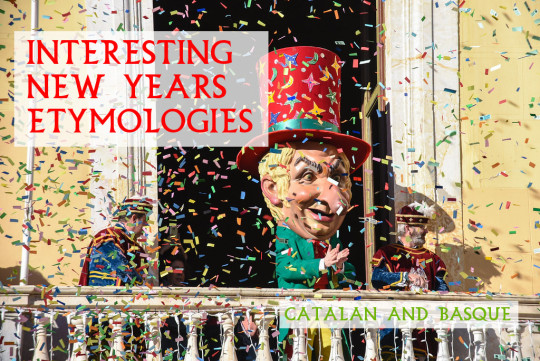I'm a Linguistics student and an avid language learner. I used to be all over the place, but for some time now I've managed to mainly focus on Basque (~B1), Catalan (~B2), English (C1), and Icelandic (~A1). I'm very much into Greenlandic, but I think it'll be a while before I can even introduce myself.
Don't wanna be here? Send us removal request.
Photo
Quina meravella!!! M’encisa! Bon any nou! <3 Eta bai, nahi duzunean, hitz egin beharko genuke <3 Urte berri on!

(Above: L’home dels nassos, a Catalan New Years Tradition, in the city of Tarragona, where he is represented with a tradition capgros costume; from Raquel Fabregat Moliner on Flickr.)
Kaixo @givemethelanguages, I’m your @langblrsecretsanta for this year! I saw that you’re a linguistics major and study Basque and Catalan (all of which are things I am too), so I kind of went off for your present, I hope you don’t mind. I thought it might be interesting to combine some seasonal vocabulary in Catalan and Basque with historical linguistics, so here’s some fun etymological tidbits for you! Also we should definitely talk in Basque and Catalan I need more friends who study them
revetlla
the night before a festival, like English Eve or Spanish verbena
Etymology: from vetllar ‘to hold vigil, watch over’ (cognate with English vigil), which comes from Latin vīgīlare ‘to stay awake, hold vigil’; there is also a vigilar in Catalan, which comes from the same root but is a much later loan, the first being from the 13th century and the second from the 18th century.
Home dels nassos
the “Man of the Noses”, a Catalan tradition in which there is said to be a man with as many noses as days of the year, but who only becomes visible on December 31 (when he has one nose like everyone else)
Etymology: nas ‘nose’ from Latin nāsus ‘nose’ (cf. French nez and Italian naso); the Spanish and Portuguese nariz ‘nose’ comes from Latin nāris ‘nostril’, which also gives Catalan nariu ‘nostril’. All of these, in addition to the English nose, come from Proto-Indo-European néh₂s ‘nose’.
raïm
grapes (or a bunch), which are eaten with each bell toll at midnight on New Years (same as in most of Spain)
Etymology: either from Old Occitan razim ‘grape’ or Vulgar Latin racīmus, ultimately coming from Latin racēmus ‘bunch of grapes’; compare French raisin ‘grape’ and Spanish racimo ‘bunch (of fruit)’, which come from the same root. A single grape can also be gotim, which is a Catalan innovation possibly deriving from gota ‘drop’. Another interesting grape-related word is bagot ‘unripe grape left on the vine’, which may come from Proto-Celtic *bekos ‘bee’.
campanada
a bell toll, most prominently the bell tolls at midnight on New Years (although it can refer to any bell tolling as well)
Etymology: from campana ‘bell’, from Latin campāna, the demonym for the Campania region of Italy where the best bronze to make bells came from; this in turn comes from Latin campus ‘open or flat space, plain’, meaning that Catalan camp ‘field’ and campanada are cognate (and are cognate with English camp as well).
Olentzero
the Basque Santa Claus, who comes on December 31 in the town of Ermua (although on December 24 in most places)
Etymology: of unclear origins, attested forms include Onenzaro, Onentzaro, Olentzaro, Ononzaro, and Orentzago; the most sound theory posits that it was originally Onentzaro and is derived from on ‘good’ and -zaro ‘period of time, season’, referring to the winter solstice holiday (and possibly relating to the Spanish nochebuena). The holiday is called xubilaro or subilaro in some parts of Navarre, from subil ‘Yule log’ and -zaro; in other parts it is known as sekularo, which is likely to come from Latin saeculāris ‘worldly, temporal, profane’.
Urte berri on! / Bon any nou! / Feliz año nuevo! / Happy New Year!
64 notes
·
View notes
Text
concept: you’re not absolutely fluent, but now you don’t have to switch tabs 20 times to translate words in a ten minutes video in your target language. there’s still a lot of words and phrases and conditions you don’t know, but now you’re no longer afraid to strike up a conversation with a native speaker. yes, you have your accent but you know they can understand you and you can understand them. you can express your thoughts and emotions in your target language. you can even think in your target language. and most importantly, it doesn’t feel like a target anymore, you can feel it in you. it’s your language.
2K notes
·
View notes
Text

A couple of books I got since I want to learn German (a pocket German-English dictionary and Harry Potter and the Sorcerer’s Stone in German)
41 notes
·
View notes
Photo

J. R. Williams in The Capital Times, Madison, Wisconsin, January 30, 1933
2K notes
·
View notes
Text
youtube
Seán Ó hEinirí (Seán Ó hInnéirghe, 26 March 1915 – 26 July 1998), known in English as John Henry, was an Irish seanchaí and a native of Cill Ghallagáin, County Mayo. He is believed to have been the last known monolingual Irish speaker.
#gaeilge#this is kind of sad#call me anti-progress or whatever#but I think for a language to be really healthy#mono-lingual speakers on that language need to be able to exist
116 notes
·
View notes
Text
The Irish for peninsula is leithinis.
Leith = half
Inis = island
The Irish for peninsula is half-island
I love how amazingly literal Irish is
172 notes
·
View notes
Text
Síobhan, maedb, aoibhean, Sadhbh:
No one:
Not a person:
Everyone outside Ireland:

#gaeilge#memes#im lowkey starting irish even though im the worst at starting new languages and i even tried gaeilge 3 years ago and quit like 5 days later
618 notes
·
View notes
Text
“It really wasn’t that difficult to identify in Euskara the Iberian words “balce” and “atin”. I compared “balce” to “baltz” (black). The second one was declensed: “atin” = “atean” (at the door). It took a bit more time to find out that “atin” was one of the names pre-Roman Hispanic people used to name a burial. According to the now many deciphered texts, the Iberian peoples believed that their spirit, when the corpse was left on the grave, traveled the underground world until a place beyond “the river of fire” where it would find home along with its ancestors. That’s why the burial was the “door” where they started their last journey.”
—
Jorge Alonso García, historian and linguist, famous for being one of the people who cracked the Iberian language.
According to him and his colleagues, Euskara is the last survivor of an extinct family of languages. Presumed members of said family were Iberian, Etruscan & Cretan.
100 notes
·
View notes
Text
So I came to Guadalajara for a course by the Institut Ramon Llull, and this amazing guy from Nayarit taught me how to introduce myself in Wixárika!!!!
I'm Dante: Nɨ Dante nɨpɨtítewa
I'm 21 years old: Xeite wiyári heimana xewí witári nɨpɨxeiya
I live in Tepicː Tepɨkɨ nɨpɨkíekame
8 notes
·
View notes
Text
I'm at the airport waiting for my flight to Guadalajara to be announced on the speaker :) I'm going to the International Book Fair (Feria Internacional del Libro) and I'm gonna take a course on the editorial industry by the Institut Ramon Llull in Catalan! I'm so ready! Also there's gonna be a ton of Basque publishers there!!!
2 notes
·
View notes
Photo










Something to brighten your day.
Please stay strong.
If you enjoy my art, please reblog and follow. I’ll keep doing my best.
35K notes
·
View notes
Video
youtube
In Chile, the country’s largest indigenous people, the Mapuche, will lose more than just the spoken word if their language dies out. As with other indigenous groups around the world, they are fighting to preserve their very existence.
45 notes
·
View notes
Text
Basque, Catalan
New langblrs to follow needed
Lately I’ve realized that on my tumblr feed there are plenty of beautiful pics, inspiring quotes and funny memes but not enough langblr accounts. So that feels like a right moment to discover some new ones.
Please let me know if you post about:
• Asian languages (Mandarin, Korean, Japanese etc.)
• Roman languages (Spanish, French, Italian, Portuguese etc.)
• Germanic languages (English, German, Dutch, Norwegian, Swedish etc.)
• Slavic languages (Polish, Russian, Slovenian etc.)
• Other languages*
Like this post and I’ll check your profile. Then I’ll create a list with best, in my opinion, language study accounts here.
*Other languages are welcome too! :) As a language freak I constantly feel a need to get to know many different languages. Even if it’s not really for studying but just for looking through study notes&materials for some inspiration. I’m sure most of you know the feeling :)
57 notes
·
View notes
Video
youtube
Rendition in Mexico City of Chilean Las Tesis’ Un violador en tu camino.
0 notes

















